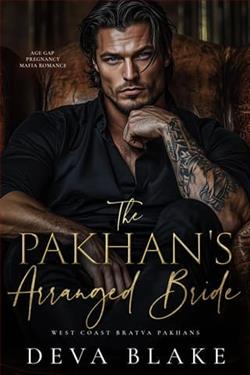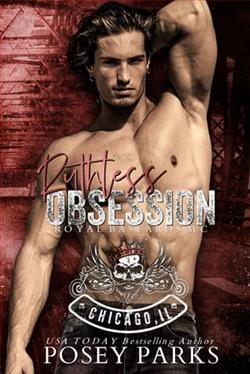Page 62 of High Season
But tonight, Nina takes a second glass of champagne from the waiter. Tonight, Nina—who usually cares so deeply about everything and everyone—is far beyond caring.
She moves from the garden room to the kitchen, tracking smears of blood across the terra-cotta tiles.
“Your foot—” someone says.
Nina walks right past them.
She spots Ryan close to the kitchen island talking to a young woman, probably the daughter—or even granddaughter—of one of Evelyn’s friends. She has that exact beauty, the strong features that come from generations of pedigree breeding, the natural highlights that suggest winters spent in the sun. Nina knows her type. She knows her type because sheisher type. She is Nina, without the headlines and the history. Without the skin-picking, and the light-switching, and the counting. The kind of person who, Nina imagines, is able to eat bread without thinking about grams of carbohydrates—or worse, who doesn’t evenlikebread, long for it, as Nina does. Who doesn’t dream, sometimes, about her dead sister.
She is Nina’s type, and she is Ryan’s type, too. She is the kind ofperson who Nina has always been afraid that Ryan secretly wants. The kind of person whose entire being isn’t so tangled up in one terrible thing that happened to them that it bleeds into every part of her. Ryan is Nina’s safe, stable place. Her biggest fear is that he might want someone safe and stable, too.
Right now, he is laughing at something the woman has said, swigging from his beer. Nina grips the stem of her champagne flute tighter, takes another slug. She hobbles around the edge of the room, slipping between discussions about which boarding school grandchildren are being sent to, the impossibility of finding good chalet girls in Val d’Isere. Nina wants to scream. She wants to shake them all, tell them how little it all matters.
Can’t you see?she wants to say.My entire life is falling apart. Everything I knew about my life is disappearing, right in front of me.
She makes it through the kitchen without being stopped, across the hallway to the stairs. Her foot is beginning to throb. She needs to get to the bathroom, to find antiseptic and bandages. She grips the banister for balance. Starts to climb the sweeping steps. She can see her mother’s pink dress, bright in the corner of her vision.
Halfway up she pauses, bending to assess the damage. Blood is beginning to clot against her skin, an ugly line of black, as though the inside of her is rotten and spoiled. The thought makes her woozy, and when she stands she has to lean both hands on the railings facing out over the room to steady herself. A tide is rising up inside her. She opens her eyes and feels, briefly, as if everyone is looking at her, their eyes twitching upward even as their mouths move, their conversations continuing. Above the hum of voices, she can almost imagine what they are saying. The same things that she’s read online, over and over again, except for this time they are being spoken out loud. Coming from the mouths of people who know her. People who were there.
I always said they should never have taken the word of a little girl.
I mean, children do make things up, don’t they?
She’s never really moved on from it, sadly.
But do you think she was telling the truth?
Do you think she was telling the truth?
The empty champagne flute slips from between Nina’s fingers and shatters against the stairs. The sound seems disproportionally loud for such a delicate thing, a crash of glass against stone. The hum of the room softens to quiet. A sea of faces turns up toward her, surprised. Wary.
All except for Evelyn. Evelyn, who is smiling. Expectant. As if she thinks that Nina might launch into a speech, her disaster a spectacle designed for her mother’s benefit.
And Nina does not like to disappoint.
“Whoops!” she says, her voice clear in the sudden quiet. “There goes my champagne toast.”
She laughs, but it sounds forced. Others join in, an uncertain chuckle rippling through the crowd. They’re watching Nina now. Properly watching her. Not the version of herself being talked about online, picked over in internet forums. The real Nina. She’s here, and she feels electrified and solid. Not someone who can be swept away in a tide of headlines and social media posts.
“Well, I suppose that as the daughter of the birthday girl, I should be thanking you all for coming to celebrate my mother,” she says, louder now. She sees Ryan coming into the hallway, the girl with perfect highlights on his left side. “Sixty-two years old! Who would have thought it?”
Someone starts to applaud, and then stops, realizing they’re clapping alone. Above her extravagant pink collar, Evelyn’s jaw has tightened, her eyes dark.
“Not that my mother likes anyone mentioning her age,” Nina continues. “To most people, she’s remained in her forties for the last couple of decades. And, as many of you know, today isn’t actually her birthday. Because for the last twenty years, we’ve been celebrating her birthday a month early. Because it’s terrible, really, isn’t it? When your own birthday also happens to be the anniversary of your daughter’s death.”
The room is completely silent now, as if everyone is holding their breath.
“Some of you probably remember it,” Nina says. “Lots of you werehere. Isn’t it mad? How we all still come back? The same party, every year. It’s pretty messed up, when you think about it. All we had to do was change the date, and everyone was happy to come and celebrate.”
“Nina.”
Evelyn is pale. There’s a warning in her voice.
“But why should I be surprised?” says Nina. “You were all there that night, weren’t you? And you all let a child testify, just because you wanted to feel better about yourselves. Because you didn’t want to think that there was anything you might have done to save my sister.”
She’s openly crying now, tears damp against her cheeks. Through the haze, she can make out Ryan’s face. The look of undisguised horror.
“If I had a glass right now, I’d raise it,” she says. “To all of you. To everyone who partied while my sister died. And everyone who’s done their best to forget it, in all the years since. Because some of us have never been able to. Some people have never been allowed to be anyone other than the kid who saw her big sister murdered.”















